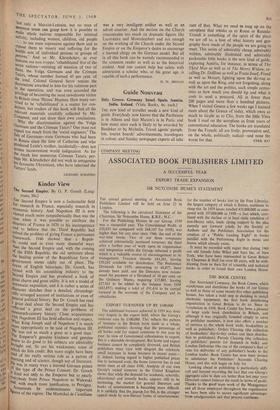Kinder View
The Second Empire. By G. P. Gooch (Long- mans, 30s.) THE Second Empire is now a fashionable field for research in France, especially research in economic history. And Napoleon III is now viewed much more sympathetically than was the case when it was possible to attribute the disasters of France in 1870 to his incompetence and to believe that the. Third Republic had solved the problem of giving France a, permanent framework. 1940 showed that a Repub- Ylic could end in even more shameful ways than the Second Empire and, with the coming of the Fifth Republic, the old optimism about the healing power of the Republican form of ,government seems oddly out of place. The doyen of English historians, Dr. Gooch, has turned with his astonishing industry to the Second Empire and has produced a book of great charm and great utility. It is not a model of sYstematic exposition, and it is rather a series of Character sketches than a detailed, chronologi- cally arranged account of institutions or even of general political history. But Dr. Gooch has read 4 great deal about the Second Empire and has reflected a great deal on the problems of nineteenth-century history. Close acquaintance with Napoleon III has bred affection and respect. 'That King Joseph said of Napoleon I is much more appropriately to be said of Napoleon III. pe was not so much a great as a good man.' he Emperor's genuine kindness and genuine ,desire to do good to his subjects are admirably brought out. So are his weaknesses, some of Winch do him credit. But more might have been said of his really serious role as a patron of learning and of science, though not of literature. se was in many ways a learned German prince pf the type of the Prince Consort. Dr. Gooch Is kind not only to the Emperor but to nearly cverYbody from Prince Napoleon to Walewski 411d, with much more justification, to Persigny. Sometimes he underestimates important figures of the regime. The Marechal de Castellane was a very intelligent soldier as well as an adroit courtier. And the section on the Church concentrates too much on dramatic figures like Lacordaire and Montalembert and not enough on the working of the Church under the Second Empire or on the Emperor's desire to encourage a learned clergy on the German model. But all in all this book can be warmly recommended to the common reader as well as to the historical student. And one cannot help but salute with admiration a scholar who, at his great age, is capable of such a performance.
D. W. BROGAN


































 Previous page
Previous page